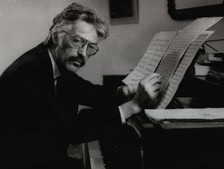
Aleksandar Vujić (1945, Serbia), composer, conductor, and pianist. Vujić holds degrees in composition (supervised by Stanojlo Rajičić, Petar Ozgijan, and Vasilije Mokranjac), conducting (supervised by Dušan Skovran and Živojin Zdravković), and an MA degree in piano (supervised by Olga Mihailović), from the Faculty of Music Art in Belgrade. He was awarded four times as the best student in his year. He has won the Zoltán Kodály Award (1983), the US government award, the state order of Israel award (1988), the first and third prize at the International Robert Schumann Choral Competition in Zwickau (1995), a gold medal for choral composition at Busan, South Korea (2002), and a gold medal at the International Choir Competition in Budapest (2009).
He is the founder, leader, and conductor of the Sinfonietta chamber orchestra and the Madrigal Choir of the Faculty of Music Art in Belgrade, and the conductor of many ensembles, including the Djakon Avakum Chamber Choir, the Baruch Brothers Choir, Iuventus cantat, etc. He is a full professor at the Faculty of Music Art in Belgrade and president of the Union of Serbian Choirs at Home and Abroad. His oeuvre in composition comprises choral and chamber works (for solo piano, solo violin, solo violoncello, violin and piano, violoncello and piano, string duo, string trio, and string quartet), as well as chamber and symphonic works. Works by Vujić have been published in the US, Germany, Italy, Hungary, and Serbia. The exclusive publisher of Vujić’s choral works is Synkope-Verlag from Germany.
Srpsko kolo (Serbian Round Dance) for string orchestra exists in multiple versions for various performing forces: piano solo, two pianos, piano four-hands, violin and piano, piano trio, string quartet, and symphony orchestra. The violin and orchestra version was written in 2008 and performed at the International Review of Composers in 2009. The Chinese ensemble chose to include it in the programme of this year’s Review.
When the guests at a wedding come together for a round dance and their enjoyment of the rhythm and beat makes their hearts dance, they yield to the racing tempo, whose waves of sound take them into an endless whirl of physical enjoyment in hopping and skipping. In this Kolo, the beat is rather important, which is meant to produce an almost trance-like condition, assisted by the highly virtuosic violin part. The piece was not composed on an existing motive or melody, but in the spirit of Serbian folk music, albeit with a modern approach. It was conceived as a piece that might adequately represent Serbia.


